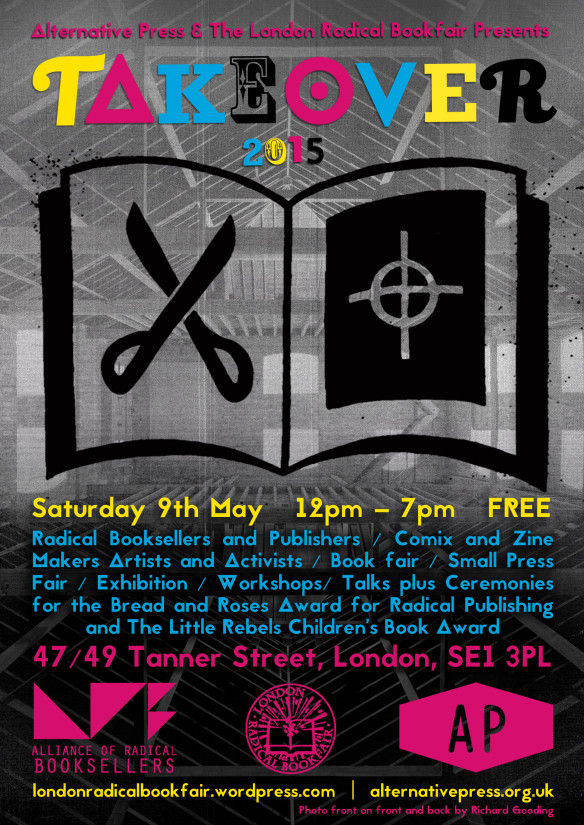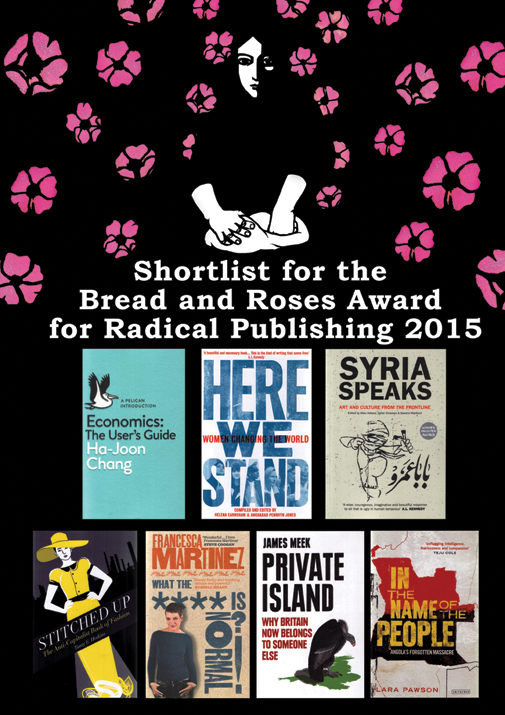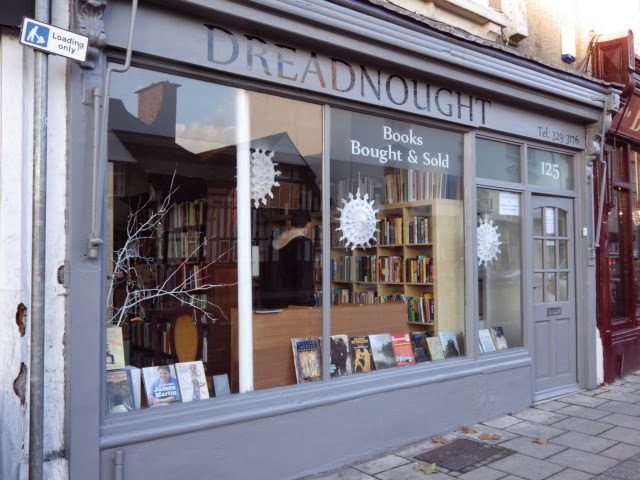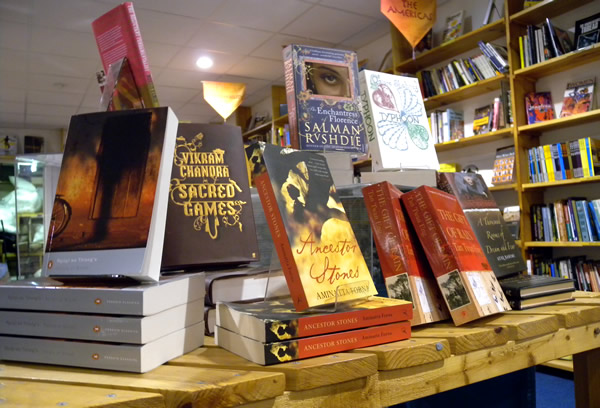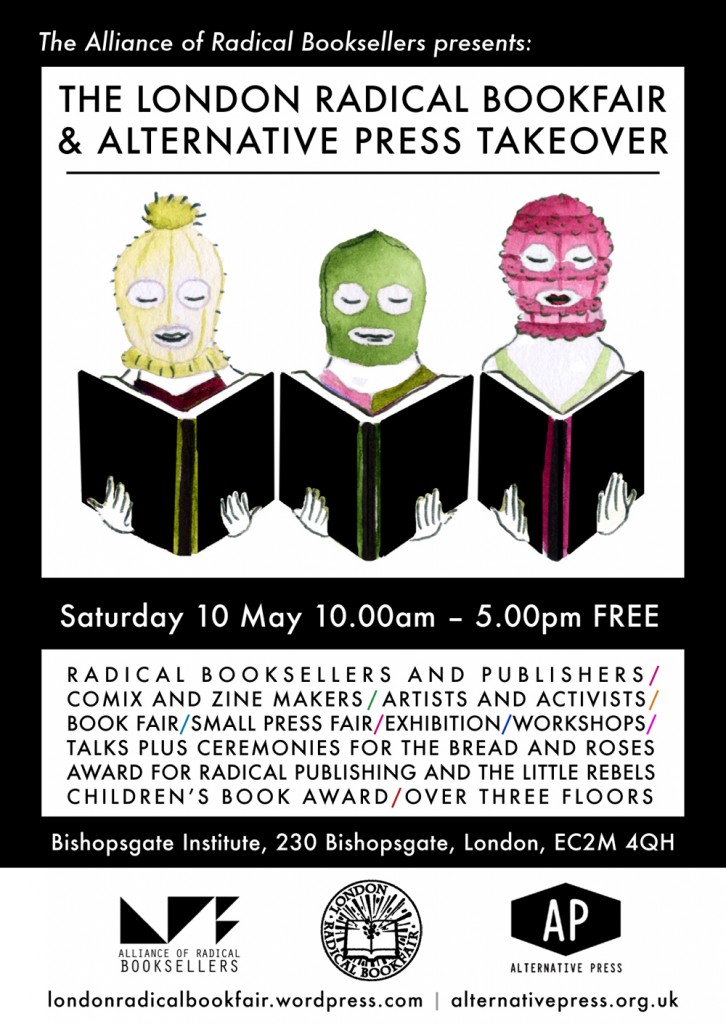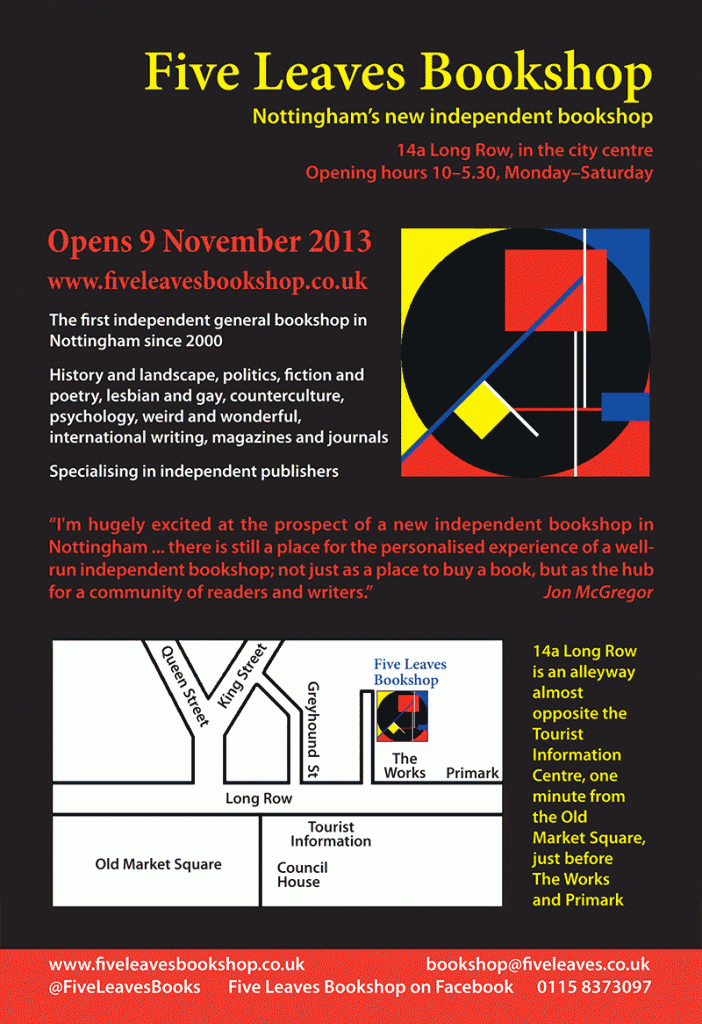We are delighted to announce the seven books which have made the shortlist for the Bread and Roses Award for Radical Publishing 2014. The winner will be announced at the London Radical Bookfair, on Saturday 10th May 2014.
‘Undercover: The True Story of Britain’s Secret Police’
by Rob Evans and Paul Lewis
(Faber and Faber, 2013)

The gripping stories of a group of police spies – written by the award-winning investigative journalists who exposed the Mark Kennedy scandal – and the uncovering of forty years of state espionage.
This was an undercover operation so secret that some of our most senior police officers had no idea it existed. The job of the clandestine unit was to monitor British ‘subversives’ – environmental activists, anti-racist groups, animal rights campaigners. Police stole the identities of dead people to create fake passports, driving licences and bank accounts. They then went deep undercover for years, inventing whole new lives so that they could live incognito among the people they were spying on. They used sex, intimate relationships and drugs to build their credibility. They betrayed friends, deceived lovers, even fathered children. And their operations continue today.
‘Undercover’ reveals the truth about secret police operations – the emotional turmoil, the psychological challenges and the human cost of a lifetime of deception – and asks whether such tactics can ever be justified.
‘Soldier Box: Why I Won’t Return to the War on Terror’
by Joe Glenton
(Verso, 2013)

When the War on Terror began, Joe Glenton signed up to serve his nation. He passed through basic training and deployed to Afghanistan in 2006. What he saw overseas left him disillusioned, and he returned manifesting symptoms of post-traumatic stress disorder. Refusing a second tour, he went AWOL and left the country, but returned voluntarily to fight his case, with the military accusing him of desertion. Despite being threatened with years in prison, he continued to speak out and won the support of many of his fellow soldiers.
Unsparingly honest and powerfully written, Glenton’s account of his personal war against an unjust occupation is the true story of an ordinary soldier standing up for his convictions, refusing to take part in a pointless conflict, and taking on the military establishment.
‘Story of a Death Foretold: The Coup against Salvador Allende, 11 September 1973’
by Oscar Guardiola-Rivera
(Bloomsbury, 2013)
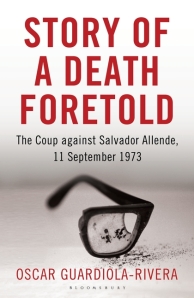
On 11 September 1973, President Salvador Allende of Chile, Latin America’s first democratically elected Marxist president, was deposed in a violent coup d’état. Early that morning the phone lines to Allende’s office were cut, army officers loyal to the republic were arrested and shortly afterwards bombs from four British-made Hawker Hunter jets began slamming into the presidential palace. Allende refused to leave his post, making broadcasts to encourage the Chilean people until the last pro-government radio station was silenced. Later that morning he was found dead, with an AK-47 that had been a gift from Fidel Castro by his side.
The coup had been planned for months, even years before it actually happened. In fact, from the moment Allende’s electoral victory in 1970 became a possibility, business leaders in Chile, extreme right-wing groups, high-ranking officers in the Chilean military and the US administration and the CIA worked together to secure a prompt and dramatic end to his progressive social programme.
Why Allende seemed such a threat in the political and economic context of the time and how the coup was engineered is the story Oscar Guardiola-Rivera tells, drawing on a wide range of sources, including phone transcripts and documents released as recently as 2008. It is a radical retelling of a moment in history that even at the height of Cold War paranoia – a time when Henry Kissinger described Chile as ‘a dagger pointed at the heart of Antarctica’ –shocked the world and which continues to resonate today. As the uprisings of the Arab Spring and the global protests at austerity measures introduced since the crash of 2008 show, the world is struggling to deal with the economic and political dilemmas Allende faced at the time.
‘Who Needs the Cuts? : Myths of the Economic Crisis’
by Barry Kushner and Saville Kushner
(Hesperus Press, 2013)

The Coalition Government in the United Kingdom, like other governments, is embarking on an unprecedented round of spending cuts. Talk of deficits, the National Debt, Quantitative Easing and other economic terminology is presented to the public as evidence that there is a vital need for some of the most drastic public-sector cuts we have ever faced.
In this highly-readbale book, Barry and Saville Kushner show clearly and convincingly that there is an alternative story that is not being told. There is a view of the economic events of the past five years that does not see the UK in debt crisis. It offers choice, differences of opinion, uncertainty and hope. It takes us on a different voyage, one beyond economics into politics and visions of society, our expectations and ambitions.
‘No Place to Call Home: Inside the Real Lives of Gypsies and Travellers’
by Katharine Quarmby
(Oneworld, 2013)
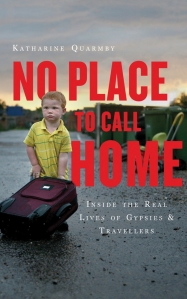
The shocking, poignant story of rejection, eviction and the fight for a home.
They are reviled. For centuries the Roma have wandered Europe; during the Holocaust half a million were killed. After World War II and during the Troubles, a wave of Irish Travellers moved to England to make a better, safer life. They found places to settle down – but then, as Occupy was taking over Wall Street and London, the vocal Dale Farm community in Essex was evicted from their land. Many did not leave quietly; they put up a legal and at times physical fight.
Award-winning journalist Katharine Quarmby takes us into the heat of the battle, following the Sheridan, McCarthy, Burton and Townsley families before and after the eviction, from Dale Farm to Meriden and other trouble spots. Based on exclusive access over the course of seven years and rich historical research, ‘No Place to Call Home’ is a stunning narrative of long-sought justice.
‘Cancel the Apocalypse: The New Path to Prosperity’
by Andrew Simms
(Little, Brown, 2013)
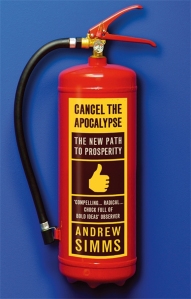
Ever get the feeling that things are falling apart? You’re not alone. From bad banks to global warming, it can all look hopeless, but what if everything could turn out, well, even better than before? What if the only thing holding us back is a lack of imagination and a surplus of old orthodoxies?
It’s a topsy-turvy world in which a country can import the same amount of ice-cream, toilet paper and other goods as it exports, and where top bankers are paid millions for destroying economic value, while hospital cleaners create value many times their pay.
In fascinating and iconoclastic detail – on everything from the cash in your pocket to the food on our plates and the shape of our working lives – ‘Cancel the Apocalypse’ describes how the relentless race for economic growth is not always one worth winning, how excessive materialism has come at a terrible cost to our environment, and hasn’t even made us any happier in the process.
Simms believes passionately in the human capacity for change, and shows how the good life remains in our grasp. While global warming and financial meltdown might feel like modern day horsemen of the apocalypse, Simms shows how such end of the world scenarios offer us the chance for a new beginning.
‘Revolting Subjects: Social Abjection and Resistance in Neoliberal Britain’
by Imogen Tyler
(Zed Books, 2013)
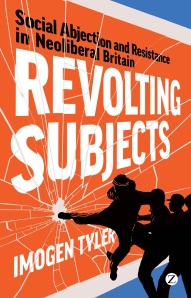
‘Revolting Subjects’ is a groundbreaking account of social abjection in contemporary Britain, exploring how particular groups are figured as ‘revolting’ and how they in turn ‘revolt’ against their subjectification. The book utilises a number of high-profile and in-depth case studies – including ‘chavs’, asylum seekers, Gypsies, anarchists and the disabled – to examine the ways in which individuals and groups negotiate restrictive, neoliberal ideologies of selfhood. In doing so, Tyler argues for a deeper psycho-social understanding of the role of aesthetic and representational forms in producing marginality, social exclusion and injustice, whilst also showing how it can be a creative resource for resistance.
Imaginative and original, ‘Revolting Subjects’ introduces a range of new insights into neoliberal societies, and will be essential reading for those concerned about widening inequalities, growing social unrest and social justice in the wider global context.

